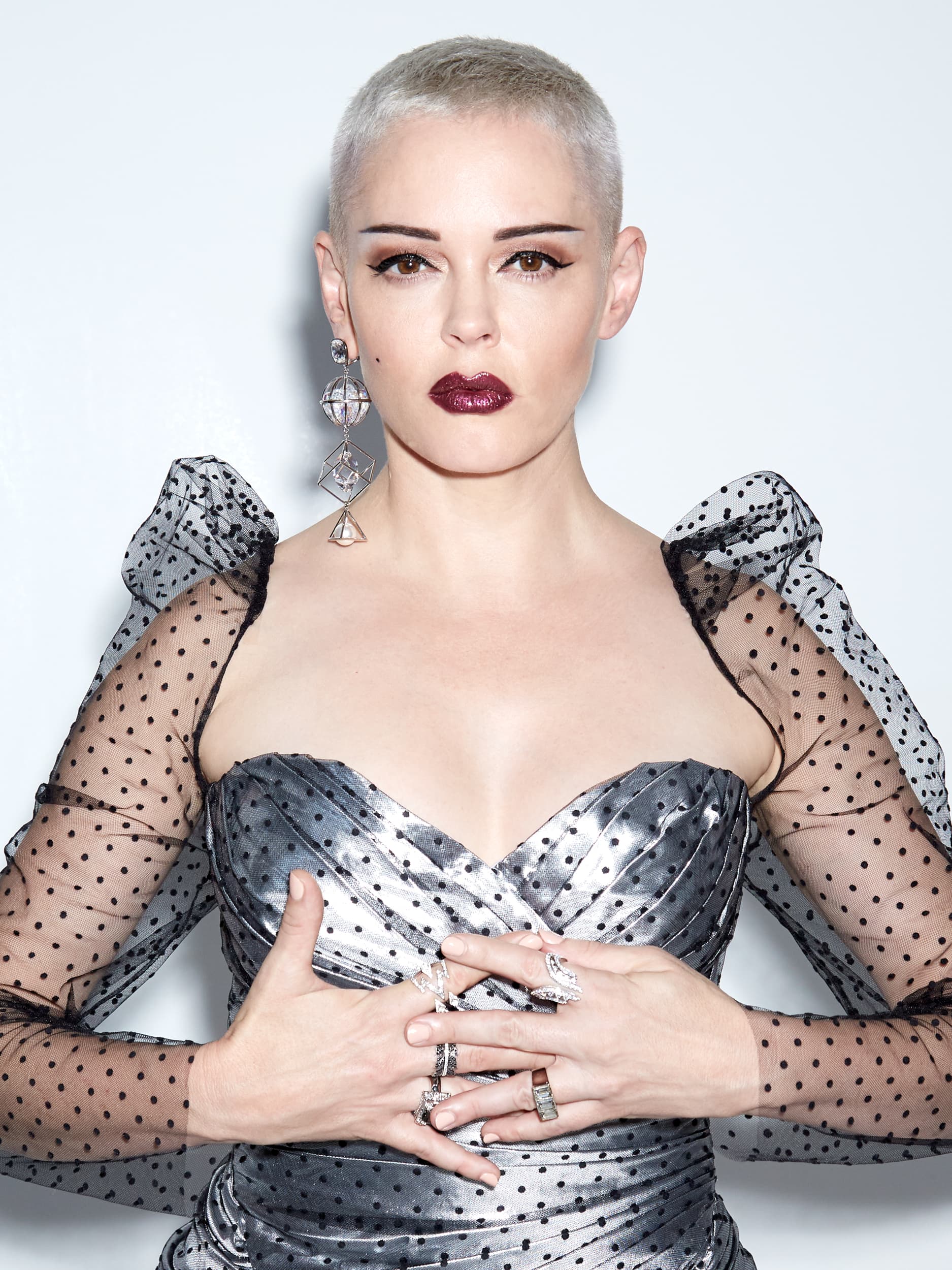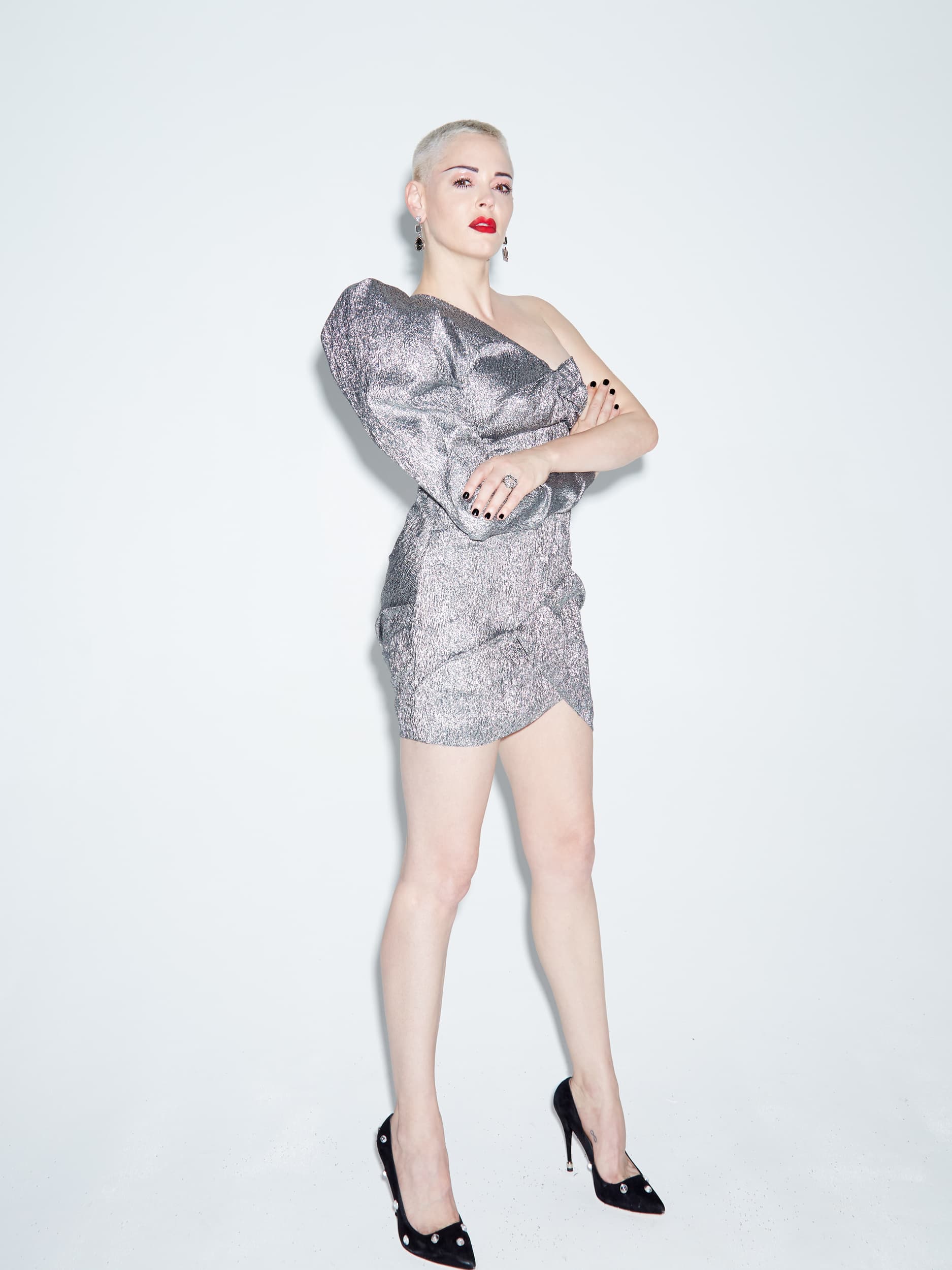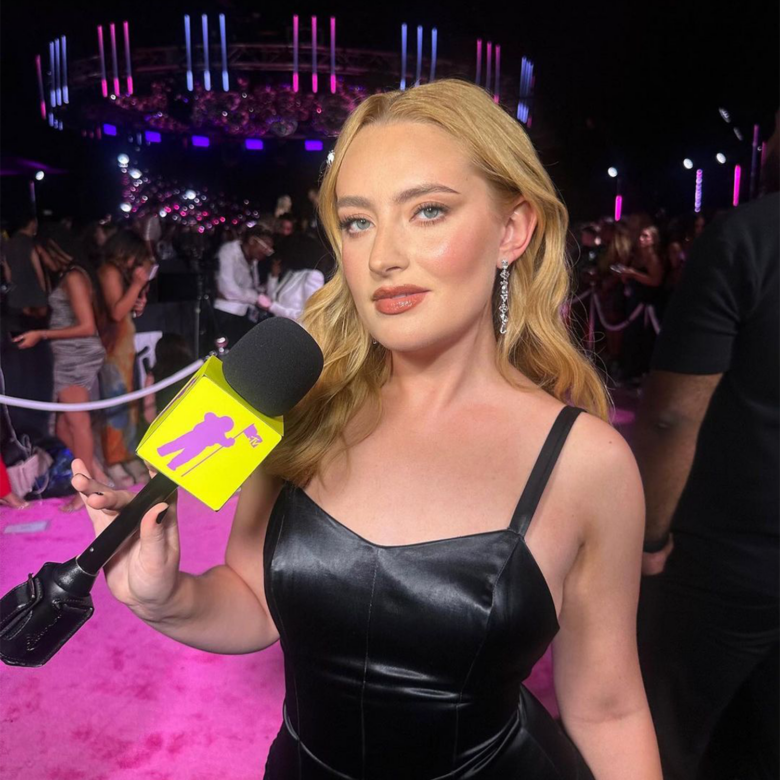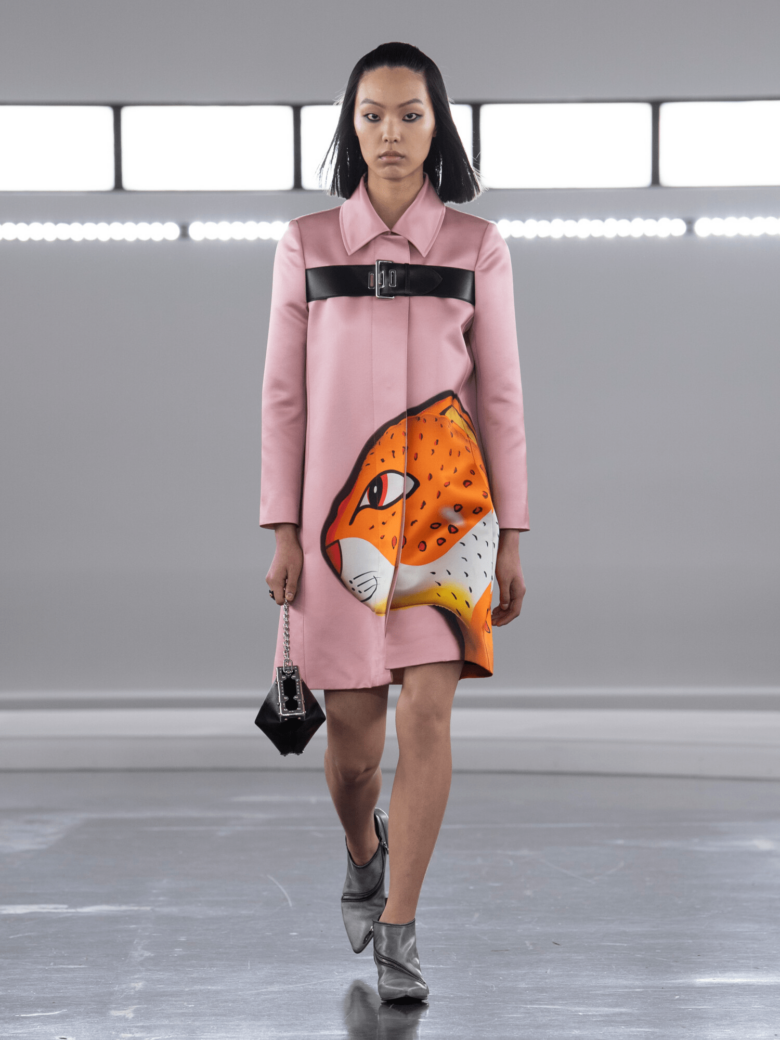Exclusive: Real Talk with Rose McGowan
“We are probably the only people in here with coats that look like that,” Rose McGowan says, laughing, as a hotel staff member crosses the lobby carrying our colourful garments to be stowed. His neat uniform undermined by the conspicuous cargo. As we share a club sandwich and tea in the hotel lounge in Marylebone I see her point, glancing at the sea of men in suits around us. “A lot of the time when I’m in London, at a place that seems more conservative, I feel like I stick out like a sore thumb.”
Of course, the actress, director, artist and activist has been used to the spotlight for decades – from her teen years growing up in La La land; red carpet provocation; headline-grabbing relationship with rock’s ultimate provocateur Marilyn Manson (more on that later); 90s scream queen days (Scream); 00s small screen queen days (Charmed). Perhaps you’re aware of McGowan from one or all of the above – understanding the star through someone else’s lens. In 2017, she fiercely reclaimed her identity. One of the first to accuse Harvey Weinstein of sexual assault after a 20-year silence, she then found herself in the epicentre of the #Me Too movement that shook Hollywood like an earthquake.
While her courageous act to speak out has admittedly reverberated on a global scale, McGowan’s role as a “silence breaker” has also seen her played out in some corners of the press as somebody constantly gripped with rage, bitterness and hate. “People on Twitter assume I’m angry,” she says, sipping her Earl Grey tea. “Twitter makes me mad [though]! That’s what it’s meant for. Twitter is where I get mad for the injustices in the world, Instagram is the softer side and I don’t know what the hell Facebook is.”
With a combined social media following of 1.5 million, Rose has a platform and damn is she going to use it. “It’s given me my own voice for the first time,” she says. “I mean I had my own voice, but every time you were sent out to do an interview, they were just asking you their questions and there was no way to express yourself or your differences or your true personality.”
In the flesh – and phone-free (excluding a brief moment during our conversation when she shows me images of her late father’s fantastically hyper-real paintings) – she is calm, open and fully engaged. Often she’ll turn the tables back on me: “Do you feel that way? What do you think?”

Today, we’re here to talk about her raw and compelling new memoir-come-motivational book, Brave. “I use a lot of my own stories to illustrate how Hollywood has given us this mirror to look into what’s artificial,” she explains. “My life has taken me from one cult to another.” She hopes it will be a helpful tool for readers: “The way I wrote it, it does get people stronger – I sometimes break the fourth wall, speaking directly to the reader. I took that from an old movie, Ferris Bueller’s Day Off.”
Admittedly, Rose’s real-life stories could not be further from the feel-good 80s flick. At times, they are truly harrowing. It begins with her retelling an unconventional childhood – being raised in the polygamous cult Children of God, of which both her parents were members, in a tiny Italian countryside town of Certaldo, (“I was told I was worth nothing in the eyes of God,” she writes. “I was told I was going to be a whore. I was told I was dirty. And the thing is, I knew they were wrong, but the words still stung.) Later, the illusion of freedom – finally escaping the cult and settling in America – cruelly shattered after a time in the talent-worshipping City of Angels.
She recounts in detail the alleged rape that occurred in a hotel room by Harvey Weinstein (whom she refers to not by name, known only as “the Monster”) after their first meeting in 1997, when she was 23-years-old. “He reminded me of a melted pineapple,” she recalls. “He could be the bogeyman of your worst nightmares. He became mine.” Though she goes through a re-trauma of sorts, picking apart uncomfortable, challenging and horrific moments that have occured in her life, she also chooses not to be defined by them. They are facets of her but not who she is.
Books, she says, were “the only things that saved me at times. If I didn’t have words I’d have nothing.” Writing Brave in 2016, after the election of Donald Trump, was a cathartic experience she says. On many levels it’s a story of breaking free from the thick layers of misogyny – seeing yourself as you are. I tell her it must be a hard and confusing life to live – juggling so many roles at one time under such intense scrutiny. The actress, the press bait, the girlfriend etc. Whilst also just wanting to be A Person. To just be.
“It’s something very few people have to go through (fame),” she sighs. “I remember breaking up with a fiancé (Marilyn Manson) and stepping outside of a 7-Eleven — it was pouring with rain and I stepped into a mud puddle and there he was on the cover of Rolling Stone with my foot on it. I just thought how strange, what a strange universe to know in the past that any exes of mine had to plagued with pictures of me everywhere and vice versa.” One picture of Rose that often gets resurfaced is a picture of her with her with Manson in 1998, wearing a ‘naked dress.’ For her, this was an act of silent protest.
“It was like the movie Gladiator where Russell Crowe comes out and says “Are you not entertained?” she says. “That’s what I did it for really. It was kind of like, ‘so this is what you want to see?’ It was my first public appearance after being assaulted and at the time was the biggest red carpet in the world – it was ‘are you not entertained and is this not what you came for?’ For me it was a political statement but it got slut-shamed immediately and globally and that was intense.”

“When I was going out with Marilyn Manson, I got “you’re his muse” a lot and it sounded like intellectual property to me but it’s like you’re sitting there looking out a window with someone making their art because they are so inspired by you but that is not how it is. It;s a mentally collaborative process just existing together as humans. To reduce someone to just a ‘muse’, I find that terminally sexist.”
She describes her one-year-old relationship with non-binary model Rain Dove, as the “first feeling of being really equal.” On reflection, she feels that even while enjoying successful acting career she always thought “the man’s job was more important.”
“I think that was just societal structuring and programming and I had a look at that. Also, as a woman I think we can get invested in our partner’s lives without realising that we are doing it for our own desires and to ignore ourselves.”
I pose the question of marriage. “I think it’s a fairly archaic institution which I don’t really understand,” she says, after some thought. “Having been married, with a man who I loved very much. I had been engaged three time before that but not because I wanted to be but because I didn’t know how to say no. In the moment of being asked, I would freeze.
It’s like I would snap outside of my body and I would look down from the ceiling and couldn’t articulate any words and I would try to look through the catalog of my mind of any woman gracefully turning down a proposal and all you see in the media is woman jumping up and down and freaking out like “oh my god he chose me!” and “yay!” but I was the opposite image of that. Not an ugly scene but there was the element of politeness. I got married because I was polite. I think a lot of people do. And I wanted to be married at the time. It was like, ‘Whats behind door number three?”
One positive she hopes to come out from people’s painful confessions is that we can hopefully redraw the boundaries that have been assumed for so long. Talking and taking action is the key.
“There’s a lot of things we also file under sexual experience thats actually not. You need to define your side of the street and their side of the street. You have to look through your own history and see where things have been different. I have a friend who sat with a group of his guy friends and they talked about times they had gone too far and they had talked about how they can be better and they talked about times they were better. I’m really not interested in the man/woman paradigm at all, I’m really interested in being human. So I think when men are like “I don’t know how to talk to women anymore” I just say well what were you doing before? Were you just groping wildly? What are you talking about? It’s time to grow up.”
One year after #Me Too played out across the world, while she feels there’s been a collective shift in consciousness, the support she’s received from fellow women in Hollywood has been dismal. “I’m on my own. I’ve given everything to this fight. I had to sell my house [in LA] to fight the monster for the legal bills. The only things I own right now in my life are a Porsche and eight cemetery plots.
“In a cemetery called Sleepy Hollow of all names. I went a little bit nuts after my father died and I bought all the space around him to stop anyone else being buried around there other than family. I thought thats a very strange thing to invest in when you are 28 years old.”
Rose describes having a “very complex relationship” with her father. “[He] was an artist. He pioneered a lot of airbrush techniques and his freehand stuff was really cerebral and fantastical at the same time with this element of realism. I love the art here [in London]. That’s huge for me.”
A return to Hollywood seems unlikely now; these days she’s more interested in pursuing photography (follow @rosemcgowanarts for updates) and film directing. “I directed a movie three years ago which was nominated at Sundance and I have another project I’m working on at the moment.” Elsewhere, there’s an experimental Planet 9 album she’s shooting visuals for, preparing for her debut performance at Edinburgh Fringe Festival in August and a natural beauty line in production. After years of nomad life, Rose also envisions making London a permanent base. “I find Mayfair at night very enchanting and I like the Hackney canals and Victoria Park. I love the Hackney City Farm.”
Just before we depart I ask her what advice she would offer those who feel there voices, for whatever reason, has been silenced? “A lot of people are afraid – a lot of them are logical fears and a lot of them are rational fears. It’s also good to write a list down of what your fears are so you can ask yourself if this is the worst case scenario, could you survive it and the answer is yes you could. Short of death then you are going to survive.”
Brave, £9.99, is out now. You can buy the book online here.

